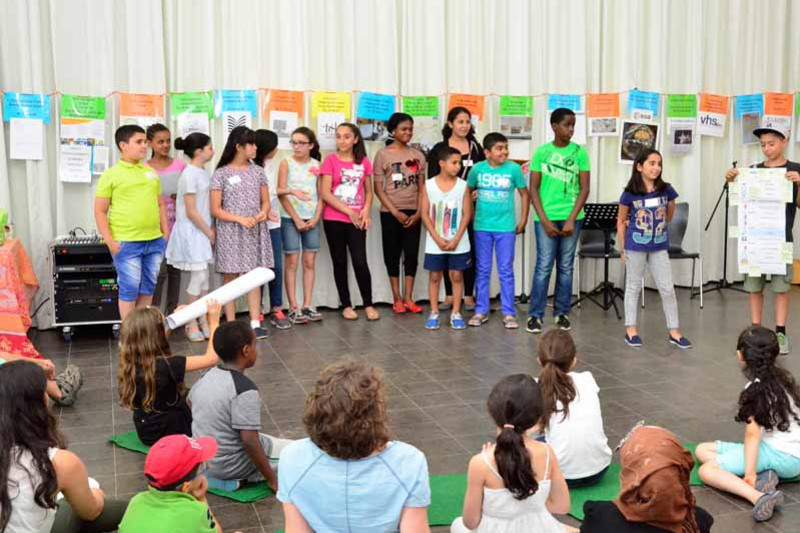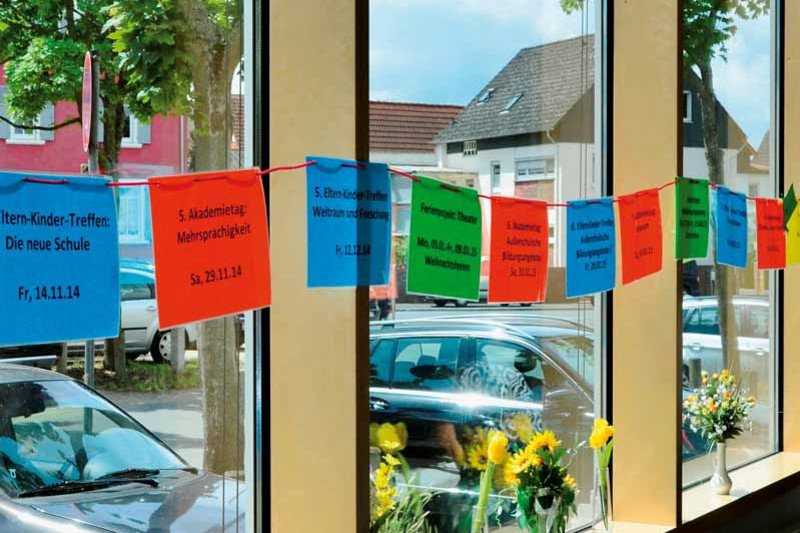First Diesterweg Scholarship in Darmstadt Comes to a Successful Close
On July 23, the Diesterweg families, together with the team from the non-profit organization “Sprachpuzzle” and numerous other guests, gathered to celebrate the successful end of their two-year journey together, which was rich in learning and experiences.
Presentations of the activities of the children and young people, grouped by age, provided insights into their rich range of experiences over the last two years, as well as the trust that developed between the children and parents and the Diesterweg team, led by Dr. Ulrike Landzettel and Murat Uzunkavak. To the congratulations of the Darmstadt mayor Jochen Partsch, transmitted electronically, were added those of Edda Haack from the Diakonie of Darmstadt-Dieburg and Walter Hiller of the Software AG Foundation. As all agreed, after reaching secondary school, it is parents who are the most important learning partners on their children’s educational paths.
In 2013, the Software AG Foundation made the “Diesterweg Scholarship,” developed by the Polytechnic Foundation of Frankfurt am Main, a reality in Darmstadt. With the Diakonie of Darmstast-Dieburg as the responsible body and the “Sprachpuzzle” organization as the concrete source of implementation, the Diesterweg program supported 15 families as their children transitioned to secondary school. Based on the insight that academic success is highly dependent on the family environment, the scholarship is directed towards students who have a positive academic prognosis, but whose family environments are not academically oriented. Not only the schoolchildren, but also their parents and siblings are invited on a two-year journey: they learn study techniques and become familiar with extracurricular learning locations in and around Darmstadt. A good mix of information about the German school system, personal counselling, and free time activities was very enriching – as confirmed by the families themselves. The 4th-grade students are by now all in secondary school, and the parents are now in a position to support their children’s continuing education. Naturally, younger children in the family profit as well, and the parents become valuable sources of guidance for friends and relatives. During the festive closing celebration, it was time to bid farewell and wish each other well. At the same time, it was gratifying to hear that the scholarship will be carried out a second time with the generous support of the Dotter Foundation in Darmstadt-Eberstadt. The families selected to participate in the program by the schools and the educational authority have already been admitted, and the program will start again in the fall.
The Diesterweg Scholarship
The Diesterweg Scholarship, named after the well-known German educator Adolph Diesterweg, is a family scholarship developed by the Polytechnic Foundation of Frankfurt am Main. Its goal is to jointly support children, siblings and parents in the fourth and fifth grades. The program offers workshops and excursions that increase the children's and families' familiarity with the German school system, with learning techniques and with informal learning opportunities where they live. In addition to individual counselling, the families become familiar with the local library, go to the theatre and to museums, and enjoy the attention and appreciation of the scholarship team and the project partners. The students are also supported throughout their first year in secondary school to ensure a solid basis for continued success.
Experiences with the Diesterweg Scholarship in Frankfurt, Hamburg, and Hannover haven demonstrated that – even beyond the academic success of the fourth- and fifth-graders - the joy of success has been contagious and empowering for many others both directly and indirectly involved.
The aims of the Diesterweg Scholarship are:
- to support children with high performance potential in receiving an academic education that corresponds to their abilities;
- to ensure that children with a non-German background successfully navigate the transition from primary school to secondary school and can be successful there;
- to increase parents' ability to supervise their children's education and to act as educational advisors;
- to bring together people from very different cultural backgrounds and life situations; and
- to bring into contact people from different city neighbourhoods.
You can find more information here.


